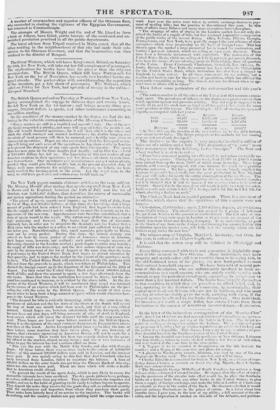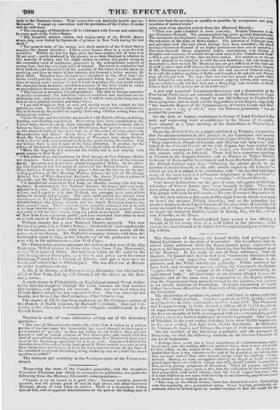tt Boarding is live doihr: per day at the hotels
in Tne re- p:lb:di is sending a strong ti,rce azainst the Indians. Th.. enuntrv all I ports are pronounced lwalthy; hat ,1t1,•.rantille revtlations aro keer, out the yellow fever it' possible. ',rids aisease, I tin s.orrv to say. emitinues to pro- duce dreadful lutrue in the Soother:1 roeions of tile l'oited States.
" .S.ntong the dreadfnl anecdotes 0 the h' heir' at New ()deans, I observe that four brothers, tailors hy trade, utIl lint within n few hours of each other, and were buried at the s one time in the sal ilk' 2.Trave.
" A NegITSS is to he .•xeruted at Georgetown. on the 4th instant, for murder : and a Noma% at the :tame time and place. for a rape.
" A planter in \'asltington comity, Alabama, Was Ala 1)y One of his own Nceroes on Alonclay week, lime slove is arreAed, and will be hung.
" Charks Edwards b5 committed for trial in Neill' I ark, cm a charge of mur- dering James l'harlcs, a steward on hoard the thip Niantic, fritai Colcutta. Both leers COlOnreil
" The Honourable George of South Carolina, has written a long defence of the celebrated Cotton Circular, lie argues, that the t.tiect of carry- ing the provisions of the circular into effect would be, to place the Southern banks on a firmer basis than any other banks in the United States ; to give them a sum of foreign exchange, and make the bills on London at Charleston as valuable as tho,c in the vaults of the Bank. lie al.:0 coot-As that it would prevent ruinous fluettiaticms in the prices of cotton. ln a litter about two months since, 1 gave you, to the best of' my ability, a full account °tithe cir- cular, and the impression it created on this side ot' the Atloutie, and portico- •
inetbd Nertheitt States. T1it hispreseionavaa. decidedly heetile and uti- Avowable. :1 repeat my conviction that the provisions of the Cotton Circular will die still-born.
" The centenary of Methodism wilt-be celebrated with fervour and solemnity inavery part of the United States.
; " The beautiful saloons, cabins, and engine-room of the British Queen steam ship, were visited by thousands of persons in New York during the last *reek."
• " The present state of the money and stock markets of the United States requires the closest attention. I have never known them in a more feverish Condition. Within the last law days, there has beets another fall of from 2 to Ele per cent.; partly produced Ity the gloomy news from England in relation to the scarcity of money and the slight decline in cotton, and partly owing to the increasing want of confidence generated by the extraordinary scarcity of money here, and the very high rates of interest. Tbe truth is, capitalists and their brokers avail themselves of the necessity of the times to excite alarm by croaking, and thus to obtain higher interest, and demand a better security for their funds. Therefore have rumours been circulated to the effect that the banks would probably suspend specie payments before long; ' and the misfore tune of raising such a rumour is, that it tends to produce the very result select' the alarmists seem to dread ; not that a measure of the kind would be either so prejudicial or disastrous, in fact, as many feel disposed to depict. "The harvest is abundant beyond precedent. The debt to foreign countries is greatly diminished; the liabilities between merchant and merehant arc di- minishing also ; and, severe as the ordeal is, it will be sure, in the long run, to lead to more prudent conduct and better times.
" I am still of opinion that no real and worthy reuse has existed for this
Epressure. It is chiefly the result of panic and eroundless excitement; but unfortunately the results are equally distressing, whether arising from real or imaginary reasons." "Lake George, and its vicinity, are crowded with British officers, on fishine, • hunting, and of expeditions. Post-offices have been established by the United StatesGovernment in those counties of the disputed territory said to • belong to Maine; and the Aim, York Iferold silys, that ' permits to cui timber on -the disputed territory have been and are in the course of being granted by Massachusetts and al:tine Every thieg is quiet on the border. General Scott, Mr. Van Buren, and. the Secretary of War, have been along the line, With a view to melse arrangements to keep the peace during the winter. I do riot believe there is any th.nger of its being disturbed. A petition for the release of Mackenzie wes ',resented to the Preeident while at Rochester." ; eigelettn the tragedian 11as recovered his health, and is now playing with !grketti snbcess in New 'lurk." ,e:H■Tlitt,yellow fever still continues its fatal ravages at New Orleans, Mobile, and Augusta. Indeed, it is unusually dreadful in all the cities of the extreme Hesertion nod death have almost depopulated Mobile. In the obit us nry lists X perceive but few names of natives of the British Islands. Among them, however, I notice iu a Mobile paper before me the decease, by the pre- vailing pestilence, of Mrs. Penelope Frances Arberry, the wife of Mr. George Ai:berry, late of Wolverhampton, England ; Mr. JR1111!S Toyior, a printer of Englantl; and Mr. Thomas Linn, a gentleman of Ireland."
" A dreadful tire occurred at New York, on Monday evening (the 25i1 Sep- -tember.) It originated in the National Theatre, the largest and most mag- etitieentits the city. That edieee wee (onsumed, worth from 00,00:1 to 101),000 :dollars; and I regret to aed, that afellack, the manager, loses some 25,000 . dollars in scenery and property. The same conflagration also burned three elturches,—viz. the French Protestant church of I.e Saint Esprit, which cost 200,000 dollars; the African chereh, and the Dutch Reformed church ; be- sides several lionises. Tie- l. caenot yet be correctly estimetste but it is said to ins from 300,000 to die &flare. Poor Walled: was not insured. Great :sympathy is felt for him. ahi nwidings are called on his behalf: The citizens eif New York farm a generous public; and I am convinced that either in meal 'OT in malt much of Walleck's It:ss will be made up to him."
Weibel( already has a new National Theatre engaged. The new - 'National at present is at Niblo's Saloon ; which will be made comfortable for the audience, and serve with tolerable convenience nearly all the Darien :es of the theatre. Mr. Wallacls's company remain with him, de- termined to stand by him, as his friends out of the profession we are sure will, in his misfortunes.—New York Paper.
• The Philadelphia papers announce the arrival at that port of the ship Euphrates, MeNeil master, in thirty-nine deys from. Cape Mensnrado, on the West coast of Africa. She had been taken on the coast by the e?ritish ship of war Harlequin, as a slaver, and given up to Governor Pechanitn, United Ste; ei Consul at Liberia, who put a new crew on Lemel, and ordered her to Philadelphia. She was fitted out at Havan- a:a ander American colours.
A Mr. J. G. Birney, of Jefferson county, Kentucky, but who had re- side:I at New York, had by will liberated all the slaves on his Ken- tucky estate.
A confectioner in Philadelphia, an Englishman named Wood, delibe- rately shut his daughter through the head, because she had married chuniestittely, told againet his consent. She was not dead when the British Queen sailed, but not expected to live. She was noted for her beauty, and formed the chief attraction of her father's shop.
The degree of LL.D. has been conferred on Mr. Grahame, author of the History of North America, by Harvard Iluiversity. Harvard Uni- versity is the oldest and best-endowed collegiate establiehluent in the Uoited States.



























 Previous page
Previous page